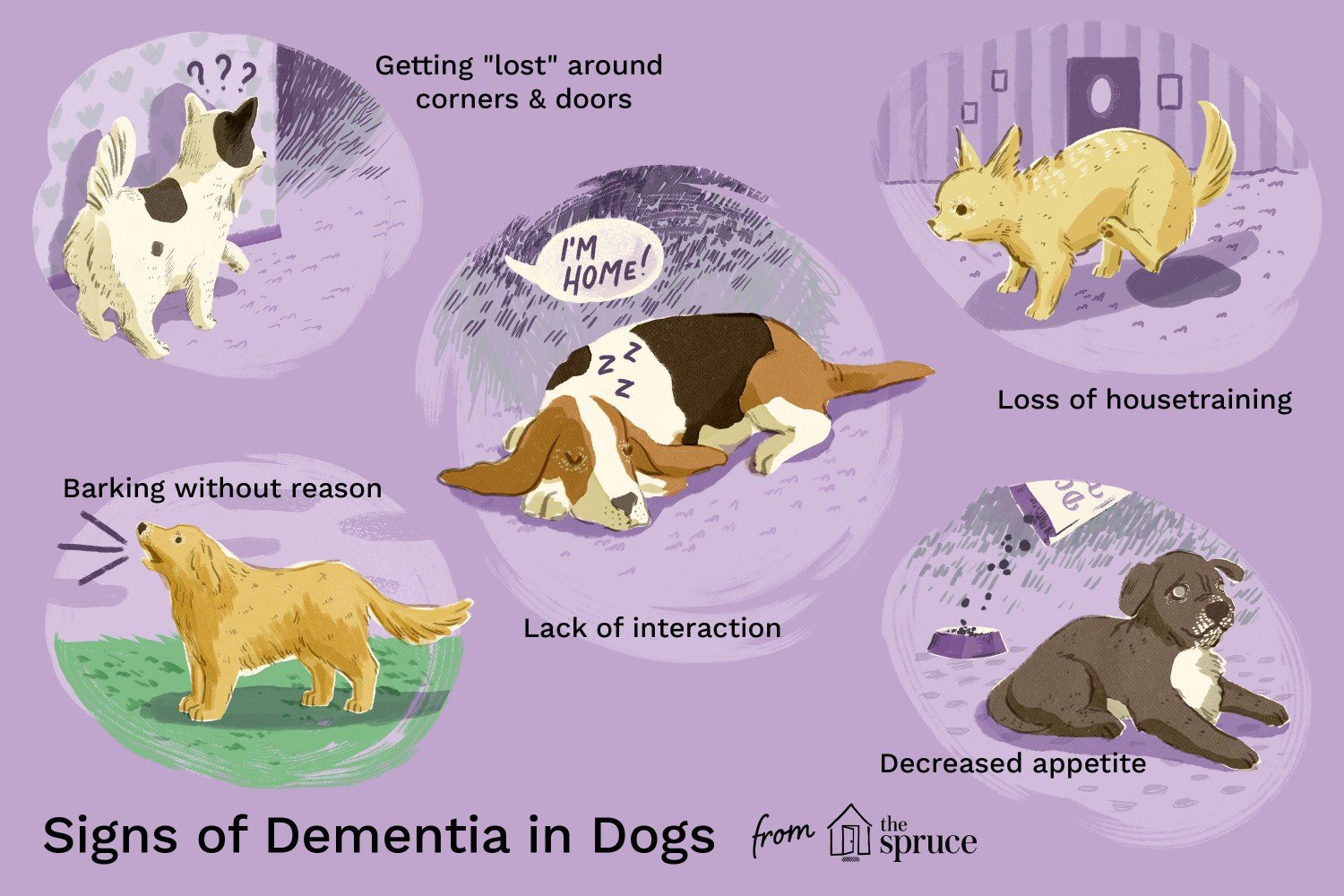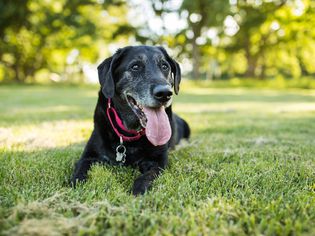Senior dementia is a common problem occurring in older dogs just as it does in aging humans. Similar to Alzheimer's in people, dementia in dogs is a degenerative brain condition that causes altered behaviors and memory loss. These progressive changes affect the quality of life for both dogs and their owners. There is no cure for dementia, but owners may be able to lessen the negative effects and help their dogs live happily for a little while longer.
What Is Senior Dementia?
Senior dementia, formally known as canine cognitive dysfunction syndrome (CDS), is a collection of symptoms resulting from progressive brain degeneration that causes changes in a dog's mood, behavior, and memory.
The Behavior Clinic at the University of California at Davis states that 28% of dogs aged 11 to 12 years display signs of dementia and that likelihood increases to 68% of dogs when they reach ages 15 or 16.
Symptoms of Senior Dementia in Dogs
Dementia negatively affects the everyday life of a senior dog and is commonly seen to varying degrees as dogs age. Some symptoms may appear and worsen gradually as the dog ages, or they may occur more suddenly and be more drastic. Irregular sleeping patterns, repetitive behaviors such as licking and pacing, a decrease in appetite, and not wanting to interact with other pets or their owners can be signs of senior dementia in dogs. These behaviors can strain relationships owners have with their dogs.
The most common signs of senior dementia can be remembered with the commonly used acronym DISHA: disorientation, interaction changes, sleep changes, house soiling, and activity level changes.
Loss of House Training
One of the biggest concerns that dog owners have is the loss of house training. As some dogs develop senior dementia they get confused and may start urinating or defecating in the house. This causes frustration for the owner who may in return get upset with their pet. This affects the human-animal bond and ultimately the quality of life of both the pet and the owner.
Disorientation
Other signs of confusion due to senior dementia include disorientation in the home, staring at walls, and going to the hinged side of a door when the dog has known for years which side of the door opens to go through it. Senior dementia can cause a dog who has known its home environment for its entire lifetime to suddenly get lost in rooms or corners of its house.
Vocalization Without Reason
Vocalizations, including barking, whining, and crying for no apparent reason, are also common in dogs with senior dementia. This may be an indication of stress, fear, or anxiety due to confusion; they may also show aggression.
Aggressive Behavior
Aggressive behaviors may be more common in dogs with dementia due to their lowered threshold of tolerance and patience. Normally patient and willing dogs may suddenly growl or bite at familiar people and pets.

The Spruce / Elnora Turner
What Causes Senior Dementia in Dogs?
No one completely understands the complex causes of dementia in dogs or humans. The symptoms of dementia are a result of changes or damage in the brain, but different manifestations of dementia may arise from different brain issues.
Sometimes, certain proteins accumulate in the brain around neurons, causing cognitive decline. The breakdown of neurons is another age-related factor in disrupting the normal transmission of information in the brain.
How Do Vets Diagnose Senior Dementia in Dogs?
Your veterinarian will rule out other medical issues, such as tumors or diseases, before diagnosing your dog's dementia. Sometimes, a questionnaire will be used to pinpoint behavioral signs that are common in this condition, so your careful attention to signs of dementia will be vital in achieving a diagnosis.
The Quality of Life Scale, or HHHHHMM Scale, is often used to aid owners in determining whether or not their dog has changed as it ages. This scale goes through the signs of dementia and includes a review of the dog's behaviors. Hurt, Hunger, Hydration, Hygiene, Happiness, Mobility, and More good days than bad are assessed on the HHHHHMM scale.
This scale helps an owner decide whether or not a pet's quality of life is still good as dementia progresses and may also help an owner decide when euthanasia should be considered.
Treatment & Prevention
There is, unfortunately, no way to reverse the signs of dementia in dogs but there are some nutritional aids that can be administered to help potentially delay brain changes as a dog ages. Antioxidants, omega-3 fatty acids, vitamin E, and medium-chain triglycerides (MCTs) are the main dietary components that are often discussed for brain health.
Other supplements used to support brain health and manage symptoms of dementia are SAMe, Denamarin, Silybin, and Cholidin.
Some experts recommend supplementing dogs' diets before they begin to show signs of senior dementia, but there is little evidence that this works as a fully preventative regimen. If you are concerned with CDS developing in your senior dog, talk with your veterinarian about possible preventative supplements.
Prognosis for Dogs with Senior Dementia
Dementia is a progressive condition that can, at best, be stabilized for a period of time. No matter how supportive owners are or how diligent they are in providing brain-healthy supplements, the process of aging will further deteriorate their dogs' brains. Once dementia becomes severe and negatively impacts the quality of life, most owners will have to make the difficult decision to euthanize their dogs.
Related Article

Training a Dog to Roll Over
"Roll over" is a cute and fun trick to teach your dog. Before you start, your dog should already be

Why Does My Dog Eat My Underwear?
There are a few reasons why your dog is eating your underwear, including curiosity and attraction t

Reasons Why Your Dog Follows You Everywhere
Whether you named your dog Shadow or not, there’s a good chance that your canine companion follow

Why Dogs Get Aggressive and How to Stop It
Whether it is directed towards you or another family member, a stranger, or another animal, an aggr

How to Train Your Deaf Dog
Even though they aren't able to hear commands, deaf dogs can be trained to obey their owners. Of co

Can Dogs Eat Pecans?
Are you wondering if dogs can eat pecans? While these tree nuts are a nutritious, protein-rich snac

Keeshond: Dog Breed Characteristics & Care
Referred to as the Dutch Barge Dog, the keeshond is a medium breed from the Netherlands with pointe

Everything You Need to Know About Adopting a Senior Pet
November was National Adopt a Senior Pet Month, and it was a good reminder that—especially this t
About Ask a Paw
We are a premier digital platform committed to delivering high-quality content to our readers. Our mission is to provide accurate, reliable, and engaging information that adds value to our audience's daily lives.
Our team consists of experienced content creators and subject matter experts who uphold the highest standards of professionalism. In an era of information overload, we curate content with care, ensuring our users receive only the most relevant and trustworthy information.
Beyond just reporting facts, we focus on depth and context. Through expert analysis, comprehensive research, and clear presentation, we help our audience gain meaningful insights and make informed decisions.
We take pride in being a trusted information source for our growing community of readers. Our user-first approach means we continuously adapt to provide content that meets our audience's evolving needs and interests.
Innovation and excellence drive everything we do. We're committed to improving our platform and services to deliver the best possible experience for our users.


Comments on " Senior Dementia in Dogs" :